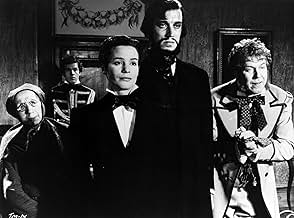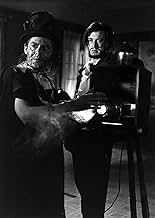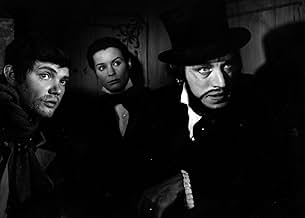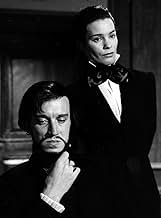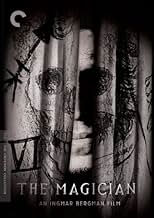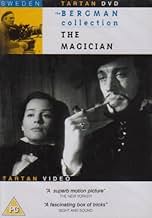IMDb रेटिंग
7.5/10
12 हज़ार
आपकी रेटिंग
अपनी भाषा में प्लॉट जोड़ेंA traveling magician and his assistants are persecuted by authorities in Sweden of the 19th century. Their capture, however, didn't bring victory to those in power.A traveling magician and his assistants are persecuted by authorities in Sweden of the 19th century. Their capture, however, didn't bring victory to those in power.A traveling magician and his assistants are persecuted by authorities in Sweden of the 19th century. Their capture, however, didn't bring victory to those in power.
- 1 BAFTA अवार्ड के लिए नामांकित
- 3 जीत और कुल 2 नामांकन
Frithiof Bjärne
- Border Officer
- (बिना क्रेडिट के)
Tor Borong
- Border Officer
- (बिना क्रेडिट के)
फ़ीचर्ड समीक्षाएं
Everybody wants to believe, born into a world that constantly deceives, that magic is real, as we make a deal, with an agent that death's door conceals - or at least that was the case in ages past when such beliefs were seared into you from birth.
Don't be fooled by what you see, the customs, costumes distract thee, a grand façade to suck you in, from birth, controlled, conditioning.
The illusions that confuse and abuse perfectly encapsulated in a magical and mesmerising piece of cinema that merits repeated reviewing, and why wouldn't you with several Bergman stalwarts performing to their absolute best, and some.
Don't be fooled by what you see, the customs, costumes distract thee, a grand façade to suck you in, from birth, controlled, conditioning.
The illusions that confuse and abuse perfectly encapsulated in a magical and mesmerising piece of cinema that merits repeated reviewing, and why wouldn't you with several Bergman stalwarts performing to their absolute best, and some.
Many people may have missed the satisfaction of reading the extra layer of meaning in this film: that the "magician" is the the filmmaker or visa versa, in this case Bergman himself. Without giving anything of the plot away, I can say that The Magician is a reflection on Bergamn's role as a creator of illusions. He uses the story of a roving theatrical troupe with an magician to illuminate the metaphor. The apparently abrupt turn of events at the end is Bergman's signal that he is the master of your perceptions in this medium, that he compares to the experience of dreaming.
It is interesting to compare this film with Fellini's 8 1/2, another filmmaker's reflection on the process and meaning of film-making. Two very different sensibilities are at work in these two films, but with surprisingly close parallels in their endings, and involuted plots.
I found this film highly satisfying on many levels, even taken at its apparent face value, as a romp. Seen a second time the illusionist begins to emerge more clearly, from the moment the film opens, with the lighting of the arc lamp of a film projector.
It is interesting to compare this film with Fellini's 8 1/2, another filmmaker's reflection on the process and meaning of film-making. Two very different sensibilities are at work in these two films, but with surprisingly close parallels in their endings, and involuted plots.
I found this film highly satisfying on many levels, even taken at its apparent face value, as a romp. Seen a second time the illusionist begins to emerge more clearly, from the moment the film opens, with the lighting of the arc lamp of a film projector.
With the exception for the abrupt and somehow rushed and unsatisfying ending, "Magician" is a typical (in a good sense of the word) Bergman's film that I liked a lot. I would call it "The Tortured Soul of an Artist or Smiles of a Summer Night meets Hour of the Wolf." I did not know what to expect from the film and was pleasantly surprised by an interesting story; impressive (especially in the earlier scenes in the woods) black and white cinematography; perfect blend of humor, intense drama, and mystery. Acting was perfect - not a big surprise with the cast like that: Max von Sydow, Ingrid Thulin, Gunnar Björnstrand, Bibi Andersson, and Erland Josephson. I'd like to mention Naima Wifstrand as Granny Vogler - what a great actress and what a character - she stepped out from the pages of the fairy tales, the old witch, wise and powerful; she also provides many comical scenes.
7.5/10
7.5/10
The Magician's original Swedish title is Ansiktet, which in Ingmar Bergman's language means 'The Face'. It's also worth noting (thanks to the Peter Cowie essay with the DVD) that the subtitle in the script is 'A Comedy'. Is much funny in this film? There is some absurdity - very dark, brooding, harrowing, sometimes horror-movie absurdity - but maybe it's there. There's even some humor to be had among the supporting characters, like the (for 1958 frank) sexual talk with Bibi Andersson's character and the younger man with the magician troupe. But it's all the same fascinating to see those two points - the fact that, as in many of Bergman's other films, the face is key as almost a plot device, and that he sees it as a comedy. But hey, so did Hitchcock with Psycho, right?
The Magician is set in the mid 19th century and is Bergman right after the one-two punch of The Seventh Seal and Wild Strawberries continuing his cinematic inquest into truth and enlightenment. The conflict is not exactly plot driven, though there is a solid premise and a good story: a "Magical Health Troupe" (that may not be the exact wording, but 'health' is in there) arrives to do a performance - this includes the Magician Vogler (Max von Sydow) and his assistant "Mr" Vogler (Ingrid Thulin, dressed like a man for a little while) - for a heavily skeptical doctor and his group (other Bergman regulars include Erland Josephsson and Gunnar Bjornstrand, the latter being the doctor). This troupe carries some baggage with them - they've been in prison before, it's spoken of - and it's obvious just by Sydow's face, with a fake beard and dyed hair, that there's something 'funny' going on.
Rationality and irrationality, that's what's at play here, and also the whole idea of what constitutes believing in something that's outside of the 'scientific' explanation. It's interesting to see that Dr. Vergerus (and this name would later pop up as antagonists in Bergman films, most notoriously in Fanny & Alexander) is probably more interested in doing the eventual autopsy of Vogler than really seeing any magic 'tricks' he has to offer - if they're tricks at all. And it's even noted that they are charlatans by one of the members in a key scene. But Bergman's aim here, and what drives things to be so moving and compelling and even touching, is how other characters react to these magicians, with their 'potions' and fortune telling. One of the doctor's wives actually takes a liking to Vogler - it should also be noted this is over the course of a night - and it's one of those scenes that is so striking for the tension in Sydow's face, how everything is building up inside of him.
It may be almost a spoiler to say that Vogler can, in fact, speak and just chooses to use it as part of his disguise. But the conflict is constantly driven by the choices and world-views of these characters, and this goes too for a 'dying' actor who is seen early on in the film and... we assume he dies en route to the main part of the story, but he re-appears mid-way through to give Vogler some late-night advice before he departs again. Is this Bergman putting himself in the film, saying that whether you bring illumination and wonder and the unknown in the world that you're still mortal? Probably, and it certainly wouldn't surprise me.
There are two main magic acts in the film, and they're both brilliant, awe-inspiring works if only on technical grounds: how characters move in the frame, the surprises that come to these people. One of these is a little quicker (the one you'll see involving 'invisible chains)). In the second, without saying too much, Vergerus does do an autopsy on a character late in the story, and this is something closest to a horror movie (ten years before Hour of the Wolf no less) and how Bjornstrand moves in this attic, how the elements may be playing 'tricks' on him, but most importantly how Bergman is making his own magic trick going on is shocking and a lot of fun.
It's actually terrifying, and in the way that you may wonder how it's being done... or, maybe that's not true, you know so much of the conflict has led to this point in the story - between what is quantifiable to a villainous man of science (yes, in this story, villainous) and what may be unknown in the world of conjuring and pulling the imaginary out of thin air - and it's because of that that you can't turn away from what will come next, while Bergman uses all the tools of cinema (cinematography playing with light and shadow, ominous music, how the actors move and react in such a tight place).
Some of the choices aren't great; I wondered why there was such BIG music near the end, it felt out of place. And I almost wished there were more 'little' moments in the film, like when the Granny character sings to one of the lady workers at the house and she slowly falls asleep. That's a really nice moment that adds to that hypnotic ambiance in The Magician. Yet I can't recommend it enough, especially to those just getting into the director's work. Not everyone here may be likable, matter of fact even the characters you're supposed to have most sympathy for are manipulative and jerky and full of angst. But do they make for some great drama? You betcha.
The Magician is set in the mid 19th century and is Bergman right after the one-two punch of The Seventh Seal and Wild Strawberries continuing his cinematic inquest into truth and enlightenment. The conflict is not exactly plot driven, though there is a solid premise and a good story: a "Magical Health Troupe" (that may not be the exact wording, but 'health' is in there) arrives to do a performance - this includes the Magician Vogler (Max von Sydow) and his assistant "Mr" Vogler (Ingrid Thulin, dressed like a man for a little while) - for a heavily skeptical doctor and his group (other Bergman regulars include Erland Josephsson and Gunnar Bjornstrand, the latter being the doctor). This troupe carries some baggage with them - they've been in prison before, it's spoken of - and it's obvious just by Sydow's face, with a fake beard and dyed hair, that there's something 'funny' going on.
Rationality and irrationality, that's what's at play here, and also the whole idea of what constitutes believing in something that's outside of the 'scientific' explanation. It's interesting to see that Dr. Vergerus (and this name would later pop up as antagonists in Bergman films, most notoriously in Fanny & Alexander) is probably more interested in doing the eventual autopsy of Vogler than really seeing any magic 'tricks' he has to offer - if they're tricks at all. And it's even noted that they are charlatans by one of the members in a key scene. But Bergman's aim here, and what drives things to be so moving and compelling and even touching, is how other characters react to these magicians, with their 'potions' and fortune telling. One of the doctor's wives actually takes a liking to Vogler - it should also be noted this is over the course of a night - and it's one of those scenes that is so striking for the tension in Sydow's face, how everything is building up inside of him.
It may be almost a spoiler to say that Vogler can, in fact, speak and just chooses to use it as part of his disguise. But the conflict is constantly driven by the choices and world-views of these characters, and this goes too for a 'dying' actor who is seen early on in the film and... we assume he dies en route to the main part of the story, but he re-appears mid-way through to give Vogler some late-night advice before he departs again. Is this Bergman putting himself in the film, saying that whether you bring illumination and wonder and the unknown in the world that you're still mortal? Probably, and it certainly wouldn't surprise me.
There are two main magic acts in the film, and they're both brilliant, awe-inspiring works if only on technical grounds: how characters move in the frame, the surprises that come to these people. One of these is a little quicker (the one you'll see involving 'invisible chains)). In the second, without saying too much, Vergerus does do an autopsy on a character late in the story, and this is something closest to a horror movie (ten years before Hour of the Wolf no less) and how Bjornstrand moves in this attic, how the elements may be playing 'tricks' on him, but most importantly how Bergman is making his own magic trick going on is shocking and a lot of fun.
It's actually terrifying, and in the way that you may wonder how it's being done... or, maybe that's not true, you know so much of the conflict has led to this point in the story - between what is quantifiable to a villainous man of science (yes, in this story, villainous) and what may be unknown in the world of conjuring and pulling the imaginary out of thin air - and it's because of that that you can't turn away from what will come next, while Bergman uses all the tools of cinema (cinematography playing with light and shadow, ominous music, how the actors move and react in such a tight place).
Some of the choices aren't great; I wondered why there was such BIG music near the end, it felt out of place. And I almost wished there were more 'little' moments in the film, like when the Granny character sings to one of the lady workers at the house and she slowly falls asleep. That's a really nice moment that adds to that hypnotic ambiance in The Magician. Yet I can't recommend it enough, especially to those just getting into the director's work. Not everyone here may be likable, matter of fact even the characters you're supposed to have most sympathy for are manipulative and jerky and full of angst. But do they make for some great drama? You betcha.
Vogler's Magnetic Health Theater rolls into town and is promptly summoned for a meet with the town big wigs. Hoping to expose all involved in the theatre as charlatans, the disbelievers request a personal show before allowing the show to go public. With very interesting results.
There is a belief amongst many Ingmar Begman fans that Ansiktet (The Magician) is far too accessible a piece to be considered one of his greatest pieces. And whilst it does find Bergman more easy to understand for the casual viewer, it's however still complex enough to thrill and niggle the mind in equal measure. Taking two factors that he very much adored, masks and magic, Bergman threads them off into various directions, and in the process testing us the audience as to just what to expect from the story. The mysterious wonder of it all is naturally aided by Bergman's use of light and shadowy trickery, symbols loom heavy without dampening the theme on offer, with nothing of course actually quite being as it seems.
As is normally the case under the master director, the cast are uniformally strong. With Gunnar Bjornstrand and Ingrid Thulin particularly standing out. But really this is all about tricks and ideas relating to magic and its blending in with reality. So much so that with the end comes an awakening that we the audience are indeed props in one of Bergman's shows, and that can never be a bad or even an accessible thing.
A fascinating picture from a very fascinating director. 8/10
There is a belief amongst many Ingmar Begman fans that Ansiktet (The Magician) is far too accessible a piece to be considered one of his greatest pieces. And whilst it does find Bergman more easy to understand for the casual viewer, it's however still complex enough to thrill and niggle the mind in equal measure. Taking two factors that he very much adored, masks and magic, Bergman threads them off into various directions, and in the process testing us the audience as to just what to expect from the story. The mysterious wonder of it all is naturally aided by Bergman's use of light and shadowy trickery, symbols loom heavy without dampening the theme on offer, with nothing of course actually quite being as it seems.
As is normally the case under the master director, the cast are uniformally strong. With Gunnar Bjornstrand and Ingrid Thulin particularly standing out. But really this is all about tricks and ideas relating to magic and its blending in with reality. So much so that with the end comes an awakening that we the audience are indeed props in one of Bergman's shows, and that can never be a bad or even an accessible thing.
A fascinating picture from a very fascinating director. 8/10
क्या आपको पता है
- ट्रिवियाThe character of Vogler was based on Bergman himself.
- गूफ़(at about 13 mins) When Tubal gets on in a carriage, a policeman hangs outside the carriage door but in the very next shot, the policeman is again seen to hang on the same door.
- भाव
Dr. Vergerus, Minister of Health: Either this is a dream or I'm losing my mind. Since It's inconceivable that I've lost all reason, I'll just wait till I wake up.
- कनेक्शनFeatured in Premio Donostia a Max Von Sydow (2006)
टॉप पसंद
रेटिंग देने के लिए साइन-इन करें और वैयक्तिकृत सुझावों के लिए वॉचलिस्ट करें
- How long is The Magician?Alexa द्वारा संचालित
विवरण
- चलने की अवधि1 घंटा 41 मिनट
- रंग
- ध्वनि मिश्रण
- पक्ष अनुपात
- 1.33 : 1
इस पेज में योगदान दें
किसी बदलाव का सुझाव दें या अनुपलब्ध कॉन्टेंट जोड़ें


